To the current generation of tennis fans, the history of the French Open begins in 2005, when Rafael Nadal won his maiden title at Roland Garros. Off the last ten editions of the French Open, Nadal has won nine, his only loss at the event having come in 2009, when Roger Federer won the title. But, many other players, Bjorn Borg, not being the least of them, have dominated the French Open. Let us now take a look at all the French Open Champions before Nadal stamped his presence over the tournament.
#1 Ken Rosewall (1968)
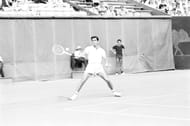
Ken Roswall remains the greatest player never to have won Wimbledon. The Australian ace, who spent the better part of his career in the shadow of his more illustrious compatriot Rod Laver, was among the legends at the time when the ‘Open Era’ began in tennis.
In the inaugural edition of the French Open in the ‘Open Era’, Rosewall got the better of Laver in a four setter to win the title, after a gap of fifteen years. Rosewall, who is renowned for his longevity, holds the distinction of being the youngest and oldest champion of the Australian Open. In all, Rosewall won eight Grand Slam events, of which four were earned in the ‘Open Era’.
#2 Rod Laver (1969)
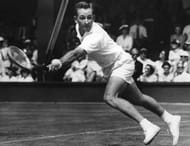
There are certain feats in sport that aren’t meant to be emulated. Rod Laver’s calendar ‘Grand Slam’ is one such. Laver remains the only male tennis player, to have won all the four Majors in a calendar year, a feat that he accomplished twice, the first time in 1962 and the second in ’69.
After having won the Australian Open in ’69, where he beat Andres Gimeno for the title, Laver arrived at Roland Garros in rampaging form. All who stood in Laver’s way were quite literally blown away as he blasted his way to a second French Open title.
Tony Roche and Gimeno were ousted en route to the final and in a rematch of last year’s French Open final, against Ken Rosewall, Laver exacted revenge, beating his compatriot in straight sets. Laver subsequently went on to win the Wimbledon and US Open that year.
#3 Jan Kodes (1970-71)

The Czech, who never played in the Australian Open, won three Grand Slam titles in his entire career, of which two were earned at Roland Garros.
Jan Kodes, a clay-court specialist, thrived on the Parisian dust, where he toppled Zelko Franulovic in the 1970 French Open final and got the better of Ille Nastase the following year. He was clinical in the ’70 final against Franulovic, whom he defeated in straight sets, even handing him a bagel in the third.
In 1973, Kodes won, what was the last Grand Slam of his career at Wimbledon, beating Alex Metreveli in a one-sided final.
#4 Andres Gimeno (1972) and Ille Nastase (\'73)
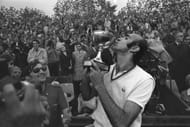
The French Open has for long been the favourite haunt of Spaniards, who seem to treat Roland Garros as their second home. In the Open Era, the tradition of Spanish domination at the French Open began with Andres Gimeno, who claimed the title in 1972, beating local hero Patrick Proisy in the final.
The 1972 French Open was Gimeno’s only Grand Slam title. At the other Grand Slam events, his record isn’t too impressive. In 1969, he was defeated by Rod Laver in the final of the Australian Open, while he failed to advance beyond the fourth round at US Open. His impressive campaign at Wimbledon in 1970, was brought to an abrupt halt by John Newcombe, who went on to win the title that year.
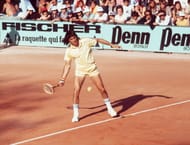
His rather modest stats do not do justice to Ille Nastase’s talent. Among the best players in the 1970s, Nastase won just two Grand Slam titles, the last of which he earned at the French Open in 1973, beating Nikola Pilic of Yugoslavia, in the finals.
Nastase, following a highly successful ’73, of which his triumph at Roland Garros remained the most cherished win, ascended to the top of the World Rankings in August of that year.
His only other success at a Grand Slam event came at the US Open in 1972, where he beat Arthur Ashe in the final. He reached the Wimbledon final twice, but the most coveted prize in tennis remained elusive to him.
#5 Bjorn Borg (1974-75, \'77-\'81)
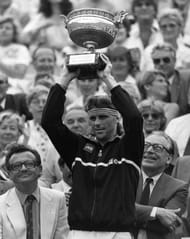
Bjorn Borg was an enigma, one which had tennis fans across the globe in thrall for nearly a decade. The laidback Swede swept into the world of tennis, not so much like a hurricane, but more like a sweet but a forceful breeze, in the wake of which, all the other players were practically brushed aside.
Although the 1970s was witness to some legends of the game, Nastase, Arthur Ashe and Jimmy Connors not being the least of them, the decade belonged to the flamboyant Swede. Borg won 10 of his 11 Grand Slam titles between the years 1974-80, the first of which came on his favourite surface: Clay, at Roland Garros in 1974.
Borg beat Manuel Orantes in a riveting five-set contest to mark the beginning of his domination at Roland Garros. His grasp of the French Open trophy slipped in the years, 1976-77, but he bounced back to win the title four times on a trot in the years 1978-81.
#6 Adriano Panatta (1976) and Guillermo Vilas (\'77)
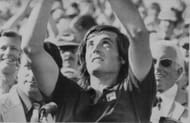
Borg was the two-time defending champion heading into Roland Garros in 1976 and he had won the World Championship tennis event, beating Guiilermo Vilas in the final early that year. Although Adriano Panatta had tasted victory against Borg at the French Open in ’73, the Swede was a completely different man and not to mention, in the form of his life, in ’76. But, Panatta scripted a historic win against Borg in the quarter-final of 1976 French Open and remains the only player to have defeated the Swede at the event.
Borg, having been eliminated, Panatta successfully took the French Open crown in ’76, beating Harold Solomon of USA in a four-set encounter. However, the ’76 Roland Garros crown was to be his only Grand Slam title.
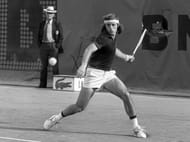
With 49 clay-court titles under his belt, Guillermo Vilas remains the most successful player on the surface. However, Vilas, unfortunate to have been a contemporary of Borg, was unable to translate his success to the French Open on a more consistent basis. His only success at Roland Garros came in ’77, when Borg did not participate in the tournament. In a lop-sided final, Vilas beat Brian Gottfried of USA to win his first Grand Slam title. Later in ’77, Vilas won the US Open, which was played on clay for the last time.
In addition to the two Majors that he won in ’77, Vilas also won the Australian Open twice, accomplishing it in successive years: 1978-79.
#7 Mats Wilander (1982, \'85, and \'88)

Mats Wilander’s dream-run in the 1982 French Open, a title which he won as a 17-year-old, seemed to mark the end of one Swede’s domination at the tournament (Bjorn Borg) while simultaneously heralding the beginning of another’s.
Borg, a six-time winner at the French Open did not take part in the tournament in 1982. And it seemed like the trophy would finally leave the borders of Sweden after a gap of four years. No one, it would seem, had accounted for the abilities of an unheralded teenager, who was determined to ensure that the title remained in the grasp of his country.
Mats Wilander beat former French Open champion, Guillermo Vilas, who was the clear favourite to win the event in the absence of Borg, in a four-setter to become the youngest Grand Slam champion (a record that was subsequently broken by Boris Becker and Michael Chang).
Much like Ken Rosewall, success at Wimbledon, where he never progressed beyond the quarter-final round, remained elusive to Wilander. However, he was no pushover on grass, as can be inferred from the two Australian Open titles that he claimed when the tournament was still played on grass.
Following his initial success at Roland Garros in ’83, Wilander went on to win the French Open on two more occasions: in ’85 and ’88.
#8 Yannick Noah (1983)

The French crowd had waited patiently for fifteen years, since the advent of the Open Era, for a Frenchman to lift the crown at Roland Garros, but their hopes and prayers had remained unanswered till Yannick Noah, breezed past Mats Wilander in straight sets in the finals of the 1983 French Open to send the crowd at the Philippe Chatrier stadium into paroxysms of delight.
Noah was the first and remains the last Frenchman to have won the French Open. Although the ’83 French Open remained his only Grand Slam title, he is remembered fondly by his fans for having lead the French Davis Cup team to a win in 1982.
#9 Ivan Lendl (1984, \'86 and \'87)
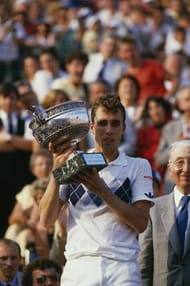
When Ivan Lendl looks back on his remarkable career, the years 1986 and ’87 are bound to induce in him, a sense of utter delight, before wallowing him up in a sea of melancholy. Four of Lendl’s eight Grand Slam titles were earned in those two years, winning both the US and French Opens in successive years. However, his attempts at winning the Wimbledon in those same years, proved unsuccessful as he came second best to Boris Becker (’86) and to Pat Cash (’87).
However, his failure to win Wimbledon, in no way diminishes his greatness. Lendl was among the most dominant players of the 1980s, occupying the top ranking for a staggering 270 weeks.
One of the best clay-court players in the history of the game, Lendl won 28 titles on the surface, three of which came at Roland Garros. Lendl’s first French Open title, which was, incidentally, also his first Major ever, came in ’84.
Facing top-seed John McEnroe in the final, Lendl was down by two sets and to bounce back from such a situation against a player, who was at that point, the best in the world, seemed a herculean effort. But, Lendl did just that to embed his name firmly in the annals of history.
#10 Michael Chang (1989) and Andres Gomez (\'90)
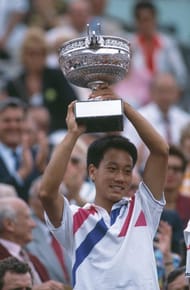
Although a victory at a Grand Slam had eluded him in 1988, top-seed Ivan Lendl was still one of the strong favourites to win the French Open in 1989. Moreover, he had reclaimed the top ranking from Mats Wilander and with the Australian Open title under his belt, was riding high on confidence. Despite Wilander being the defending champion, it seemed near impossible to stop Lendl from winning a fourth French Open crown in 1989.
No one had, however, accounted for the prowess of a 17-year-old American, who was seeded 15 in the tournament. Michael Chang, facing Lendl in the fourth round, sprang back from a two-set deficit to oust the top-seed from the tournament and stamped his presence with utmost authority in the tournament. The final against Stefan Edberg was yet another gruelling affair which lasted five sets, but Chang prevailed to win his only Grand Slam title. In the course of winning the title, Chang also replaced Boris Becker as the youngest men’s Grand Slam champion.
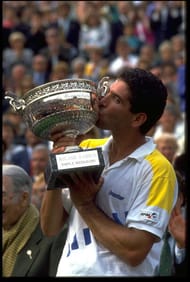
Following the success of a precocious young teenager the previous year, many were convinced that tennis was set for domination by a new bunch of youngsters. In 1990, a 30-year-old Andres Gomez, however, shattered those perceptions, when he took out a significantly younger Andre Agassi in the final.
Heading into the 1990 French Open, Gomez had never advanced beyond the quarter-final stage of a Grand Slam event and although he was seeded fourth for the tournament, was clearly not in the reckoning for the title. Incidentally, the 1990 French Open final was the first and only Grand Slam singles’ final that Gomez ever reached.
However, Gomez enjoyed a greater degree of success in the doubles’ circuit, winning two Grand Slam titles and even reaching the Number one ranking.
#11 Jim Courier (1991-92)
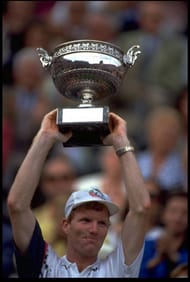
Andre Agassi was unlucky a second time running at the French Open, as he came undone in the final against compatriot Jim Courier in a high-octane five-set contest.
En route to his maiden victory at a Grand Slam event, Courier beat top-seed and then World Number one Stefan Edberg in the quarter-finals before dispatching Michael Stitch in the semis. The win against his former roommate Agassi was merely the culmination of a highly successful tournament for Courier.
His victory at the 1991 French Open marked the beginning of a glorious chapter in Couriers career. He subsequently went on to win the Australian Open in 92 before successfully defending the French Open title that year. He also added another Australian Open title to his cabinet in 94.
In February 1992, following his success at the Australian Open, he rose to World Number One, a position that he occupied for 58 weeks, intermittently.
#12 Sergi Bruguera (1993-94)
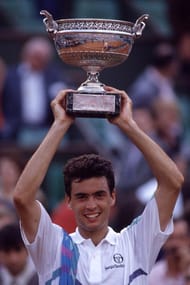
Jim Courier’s 20-match winning streak at the French Open was snapped by Sergi Bruguera, who prevailed over the American in a tense five-setter in the championship match of the 1993 French Open.
Courier, however, wasn’t the only player whom Bruguera upset in the tournament. In the quarter-finals, the Spaniard ousted top-seed Pete Sampras in four sets.
The final was a riveting contest as both players refused to yield even an inch and showed immense resolve throughout the match. Courier, the two-time defending champion hadn’t been in the best of form heading into the final,while Bruguera had dropped just one set. However, despite the contrasting routes that each had taken to the final, the title clash did not turn out to be a one-sided affair.
Bruguera subsequently went on to successfully defend his title in ’93, when he defeated Alberto Berasategui in the final match.
Bruguera, however, was unable to add to his tally of two Grand Slam titles, failing to advance beyond the fourth round of the other Majors.
#13 Thomas Muster (1995) and Yevgeny Kafelnikov (\'96)
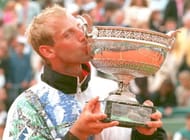
It had been six years since a 17-year-old Michael Chang had stunned Stefan Edberg and the world along with him to take the French Open title in 1989. Following his historic triumph, his career had failed to touch the same heights and a few impressive performances at Grand Slams notwithstanding, Chang’s ’89 French Open win seemed like a ‘Flash in the Pan’.
However, through the years 1995 and ’96, Chang set about altering that perception. In 1995, he reached his first Grand Slam final since ’89 against Thomas Muster of Austria at the French Open. Muster was seeded five and Chang, sixth.
In the quarter-final, Chang had caused a massive upset, beating two-time defending champion Sergi Bruguera in straight sets and, despite Muster’s higher seeding, was the favourite to win. Muster, however, had other plans.
In a largely one-sided affair, Muster took out Chang in straight sets, dropping just 11 games in the course of winning his only Grand Slam title. Following his successive run at the French Open, Muster went on to ascend to the summit of the ATP rankings in February 1996, occupying the position for six weeks in total. His best results at other Grand Slam events were two semi-final appearances at the Australian Open. At Wimbledon, however, his record was abysmal. He failed to progress beyond the first round in any of his four appearances at the event.
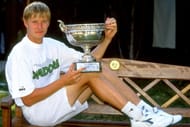
Yevgeny Kafelnikov punctured Pete Sampras’s dreams of accomplishing a ‘Career Grand Slam’, when he handed the latter one of his worst defeats in the only French Open semi-final that he appeared in. Kafelnikov dropped just eight games in the semi-final against Sampras, six of them in the first set which Sampras forced into a tie-break. Following a tensely fought first set, Kafelnikov was at his ruthless best as he handed Sampras a bagel in the second.
Following his rout of Sampras in the semi-final, Kafelnikov went on to beat Michael Stitch in the title clash, which was yet another straight-set win, to win his first Grand Slam title. Kafelnikov went on to win the Australian Open in 1999 and subsequently ascended to the World Number one position in May that year.
#14 Gustavo Kuerten (1997, 2000-01)
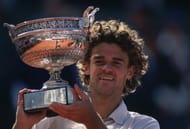
The curly-haired Brazilian was ranked 66 and hadn’t tasted a win at a single ATP tournament heading into the 1997 French Open. Moreover, he was handed a tough draw, with two former champions in Thomas Muster and Yevgeny Kafelnikov falling in his half.
Even the most daring gambler would have thought twice before putting his money on Kuerten to win the French Open that year. But, Kuerten trumped such overwhelming odds to become the first Brazilian in the Open Era and the second unseeded player to win the French Open.
Kuerten beat three former French Open champions to etch his name on the title: Thomas Muster, he took out in the fourth round while defending champion Kafelnikov was shown the door in the quarter-final. Sergi Bruguera, who had won the title twice, was beaten in straight sets in the championship match.
Following two fallow years, Kuerten returned to conquer Roland Garros with renewed vigour in 2000, beating Kafelnikov once again in the quarter-final before he beat Alex Corretja in the final to win his second French Open crown. He successfully defended the title in ’01, prevailing over Corretja yet again in a rematch of the 2000 final.
#15 Carlos Moya (1998) and Andre Agassi (\'99)

After Bruguera’s twin victories at Roland Garros in 1993 and ’94, it was time for Spanish domination yet again at Roland Garros and flying the French Flag high was Carlos Moya.
Moya, who ended as a runner-up at the 1997 Australian Open, losing to veteran Pete Sampras in the final,was determined to get his hands around a Grand Slam trophy. He realised his dream when he beat Alex Corretja in an all-Spanish final at Roland Garros. For Corretja, it was the first of the three French Open finals that he would go on to lose. Moya subsequently went on to reach the World Number One Ranking in March 1999, but failed to add another Grand Slam to his trophy cabinet.
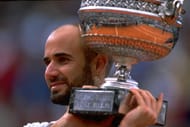
Andre Agassi was seeded 13 in the 1999 French Open. Over four years had elapsed since he had last won a Grand Slam and he was a far cry from the player who had beaten Goran Ivanisevic in a thrilling five-set final at Wimbledon in 1992. Agassi had, in fact, been a two-time finalist at Roland Garros, losing to Gomez in ’90 and to Courier in ’91.
The French Open was the only Major that stood between him and a ‘Career Grand Slam’ and although he was far from being the dominant layer he once was, he seemed quite resolved to set that record straight in 1999.
His biggest win in ’99 Roland Garros came in the fourth round when he beat defending champion Carlos Moya in four sets. The final against the unseeded Andiry Medvedev, who many expected would be a pushover, was however, his hardest.
Agassi lost the first two sets, winning a meagre three games in them and looked down and out. However, in one of the greatest comebacks in recent tennis history, Agassi fought back to take the match in five sets. Agassi beat Medvedev 1-6, 2-6, 6-4, 6-3, 6-4 to win his only French Open title.
#16 Albert Costa (2002) and Juan Carlos Ferrero (\'03)
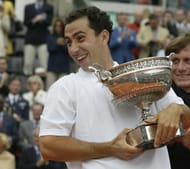
Two-time defending champion Gustavo Kuerten, despite having fallen in the ATP rankings was still being considered the favourite to win the 2002 French Open.
In stark contrast, Albert Costa, hadn’t won a single title since 1999 and despite being seeded 20th for the event, was largely unknown, outside the tennis fraternity.
However, in 2002, the immensely gifted Costa decided to keep his tryst with glory. In the fourth round, Costa caused a massive upset when he knocked out Kuerten in straight sets. He was tested most severely by Guillermo Cansas, who pushed him to five sets in the quarter-finals. Costa prevailed and beat Alex Corretja in the semi-final before taking out Juan Carlos Ferrero in the championship match to win his first and only Grand Slam title.

Having fallen to compatriot Albert Costa in the summit clash in 2002, Juan Carlos Ferrero returned to Roland Garros the following year, resolved to win the title that he had missed by a whisker last year.
The semi-final in 2003, turned out to be a rematch of last year’s final, as he went up against defending champion Albert Costa. This time, it was the younger man who prevailed. Ferrero beat Costa in straight sets to set up the title clash with Martin Verkerk.
Although unseeded, Verkerk had shown what he was capable of, having taken out former French Open champion Carlos Moya en route to the final. However, Ferrero made it a no contest, as he dropped a mere six games to win his solitary Grand Slam title.
Following his success at the French Open, Ferrero subsequently went on to reach the top ranking, but failed to hold onto it for long. Ferrero went six years without winning an ATP title.
#17 Gaston Gaudio (2004)
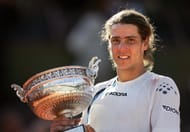
Roland Garros 2004 was an Argentine affair. Three of the four semi-finalists were from that country and the final too turned out to be an all-Argentine affair.
Guillermo Coria, who was the third seed in 2004 French Open, had fought back from two sets down in the semi-final against Tim Henman to book his spot in the championship match. Coria was in resplendent form heading into the tournament and was one of the forerunners for the crown that year.
His final opponent, Gaston Gaudio, on the other hand, was unseeded and came into the final as the proverbial underdog. Despite having registered a thumping win against David Nalbandian in the semi-final, Gaudio wasn’t perceived as a huge threat to Coria.
The final started with Coria dominating proceedings. Coria got off to a flier, winning the first two sets before he was laid low by cramps. Although Coria battled the pain, he failed to deny Gaudio a win.
What is the foot injury that has troubled Rafael Nadal over the years? Check here
